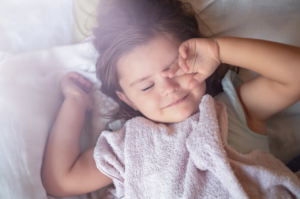
I recently read a study exploring genetic sleep traits in this paper by Kocevska et al., 2023. The authors were looking at whether certain sleep characteristics present in early childhood persisted through childhood, adolescence and into adulthood.
It’s known that many sleep characteristics, including difficulty falling asleep, nighttime waking, and insufficient sleep are common in childhood, with about 30% of 1-12 year old children experiencing these issues. But these traits also have a known genetic link.
Two other studies have recently found that the genetic variants for circadian preference are associated with sleep timings from infancy and that these timing preferences persist all the way through to adolescence. The patterns observable in infancy predict the sleep trajectories from childhood onwards.
The researchers wanted to see if the genes for insomnia, night waking and insufficient sleep duration matched their sleep patterns in infancy and childhood. Now, you might be thinking, well, duh, of course they would. But it’s an interesting study because of course, we know that children are influenced by nature and nurture. Furthermore, parental report of sleep problems is influenced by:
- Parental recall bias
- Perception of ‘poor’ sleep not matching realistic expectations
- Parental mental health
And of course, many parents are just plain blown away by how difficult parenting is. So, some parents will report that their infant (with perfectly normal sleeping pattern) has a sleep problem simply because they find being woken in the night at all, hard. So this study was attempting to objectively assess whether the children who had genetic markers for various sleep problems, did indeed have problematic sleep when they were tiny.
Of course, we wouldn’t expect every child who is reported to have problematic sleep to have genetic markers for poor sleep. Some children’s sleep patterns are influenced by the environment, poor sleep hygiene, feeding challenges, difficulties with respectful limit setting, and so on.
The study was a population cohort from the Netherlands, with a chunky sample of 2458 children (51% girls) of European descent (yep, there’s a big piece of missing data with the lack of diversity here, but let’s not give up on the study!). The children were followed through adolescence and data was collected at 18 months, 3, 6 and 10-15 years through questionnaires, sleep diaries, parental report, interviews and sleep characteristic checklists. At 10-15 years a sub-sample of 975 children also had their sleep objectively measured with actigraphy devices. They all had cord blood samples or a blood test at 6 years of age, and all the children were genotyped.
The study found a significant genetic predisposition to insomnia specifically related to sleep problems such as difficulty falling asleep or frequent night waking and this behaviour was present early in life.
It also found the genetic predisposition to longer total sleep duration was offset by more waking in the night.
So what does this mean?
This study did not include a sample that represents the global majority, and we need more similar studies that attempt to identify whether these findings are true in other more diverse populations. Still, I think there are a few things we can take from it:
- Some little ones may have more challenging sleep that is more resistant to mainstream techniques to improve sleep.
- Perhaps we need to develop a way of thinking about sleep that accounts for the genetic tendencies that might be apparent early on.
- Some parents may need more support with sleep that does not seem easy to optimise with the usual strategies to improve sleep hygiene and sleep biology.
- While not all sleep challenges are caused by genetics, it’s clear that a large proportion are, so perhaps we need to routinely ask about parental history of sleep behaviour.
I also really appreciate this study because so many studies that look at later childhood or adolescent sleep problems imply that the blame is on parents for not ‘tackling’ poor infant sleep and causing long term sleep problems. Essentially, that parental behaviour (such as promptly responding) is responsible for disrupted or short sleep. This study fairly conclusively finds that the parents who were reporting significant sleep problems in early childhood had children who had genetic markers for poor sleep. It was nothing to do with their parenting/feeding/cosleeping/fill-in-the-blank (!).
So, while you’ll never hear me blame parents for their little one’s sleep, nevertheless that’s how many people feel. I hope that this study will reassure them that just like you can’t take credit for your child having pale, olive, or brown skin, you can’t take credit (or blame) for their genetic sleep characteristics either. I hope if nothing else, this is a weight off some people’s shoulders.
But I also hope that this message isn’t received with a heartsink. I neither mean to prophesy long-term doom, nor imply that there is no point trying to optimise sleep. In fact, one of the key messages from this paper was that this study could help identify parents who might need early intervention with sleep support, given the frustrations that can occur as a result of adult sleep problems. My only hope/concern is that this isn’t interpreted by sleep trainers as offering mainstream non-responsive sleep training as a solution. Since poor sleep for some of these littles may be genetic in origin, utilising a behavioural approach such as controlled crying makes even less sense than usual!
If you’d like pragmatic, realistic information to help you with your child’s sleep, you’ll probably find my Responsive sleep support class, the Ultimate sleep class for toddlers to tweens or my sleep guides 0-18 month sleep guide, 18-36 month sleep guide, 3-6 years sleep guide, informative and empowering.

Leave A Comment
You must be logged in to post a comment.